Review: South Coast Repertory Presents WISH YOU WERE HERE
From by Pulitzer Prize winner and OC native Sanaz Toossi, this dramatic play underscored with moments of humor and emotion makes its West Coast debut.
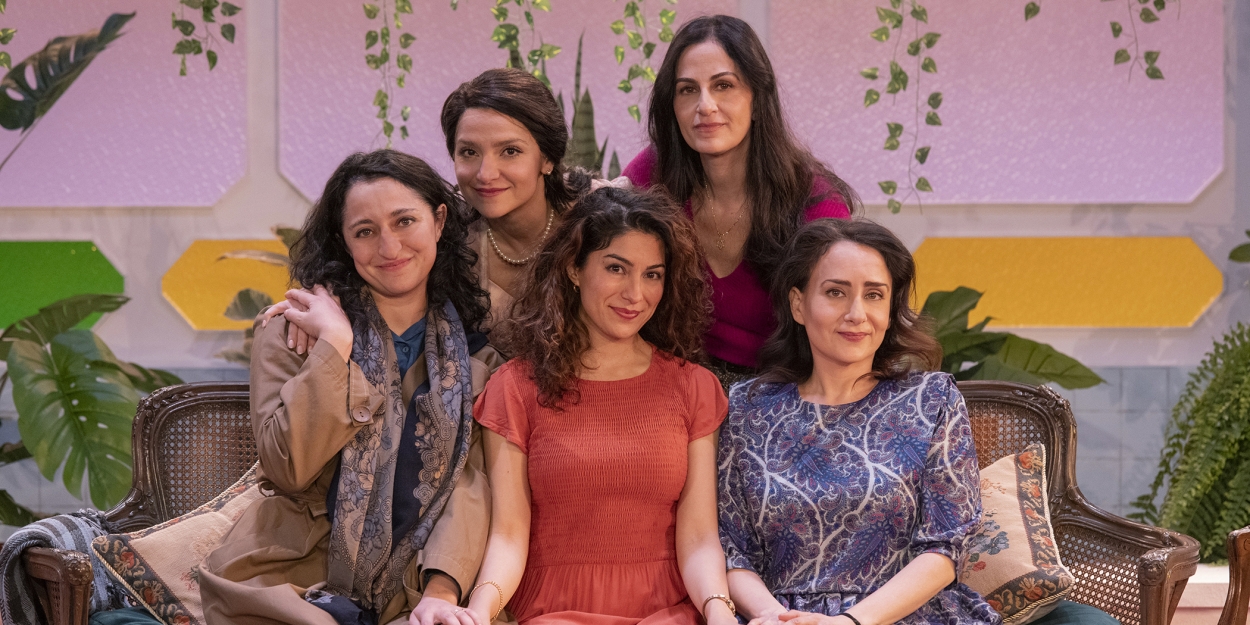
Pulitzer Prize-winning playwright and Orange County native Sanaz Toossi is finally getting her 2022 play WISH YOU WERE HERE a fully-realized production treatment right here on her own home turf at Orange County's Tony-winning theater South Coast Repertory through February 2, 2025.
Directed by Mina Morita, the play—an emotionally-absorbing drama with sprinkled bits of comedy—is, at its core, a poignant exploration of deep friendships, colored by a devotion to cultural and religious identity and the fears of displacement and upheaval set against the backdrop of Iran's political turmoil in the late 1970s and early 1980s.
As with her critically-acclaimed play ENGLISH (about to make its Broadway debut this week), Toossi mines her own background and personal family history as the basis for this play's story. In fact, Toossi's own mother—a character in the play—was in the audience during the play's Opening Night performance. The specificity, though, proves extremely universal.
WISH YOU WERE HERE centers on a tight-knit, outspoken group of five Iranian women living in Karaj, Iran, who each try to navigate their respective lives through the coming Iranian Revolution and its subsequent aftermath, dealing with both the personal and societal changes that unfold for not only themselves but for their neighbors and their families.
The play spans from 1978 to 1991, marked visually in the play by the dwindling number of occupants present on stage.
Featuring an outstanding ensemble of five very gifted actors that give their respective roles distinct personalities and quirks, the play transcends some of its staging obstacles to ultimately become one of the most emotionally resonant and relatable plays of SCR's 61st season.
With friendship as its central nucleus for being, the heart of the play revolves around the deep, very palpable bond shared between a friend group that may or may not resemble your own—which include Shideh (Artemis Pebdani), Zari (Mitra Jouhari), Rana (Sahar Bibiyan), Salme (Tara Grammy), and Nazanin (Awni Abdi-Bahri). As a collective, they are fun to watch as they gossip and banter with unabashed candor. Some individuals, naturally, appear much closer to others, as we witness some of the ladies break out into separate conversation groupings that feel more intimate and revelatory. And as with most friend groups, certain individuals take on certain roles… the maternal one, the loudest one, the shy one, the immature one, etc which switch up through the years.
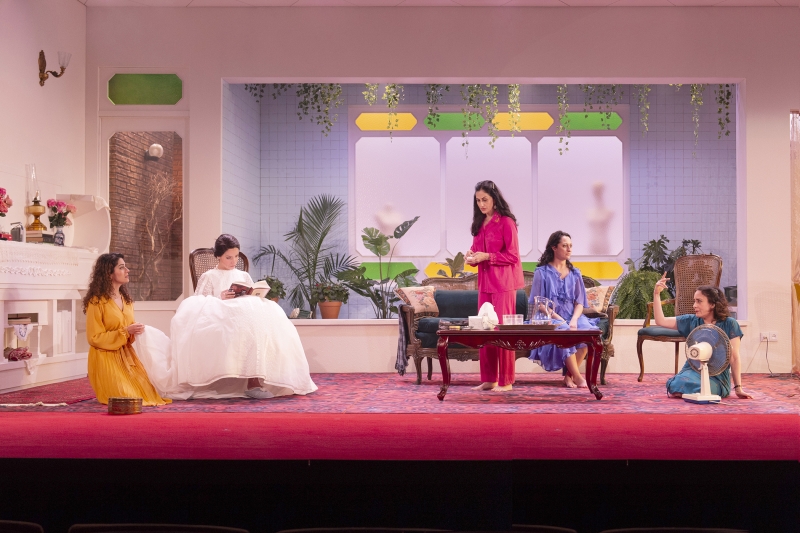
Mirta Jouhari and Artemis Pebdani. Photo by Robert Huskey/SCR.
We first meet them at relatively young ages, gabbing right before Salme's wedding. Salme seems to be the most mature and devout of the bunch, showing the most restraint amongst them during their bawdy conversations.
Through context clues, it is quite clear right from the start of the play that their friendship is a communal source of strength, camaraderie, support, and resilience—things that any person will need, particularly if you are in the midst of a geopolitical upheaval that is about to disrupt lives.
Like men in a locker room shooting the shit, these ladies banter about everything—from wedding night expectations and genitalia measurements to aspirations for higher education or career advancement. No subject seems off-limits amongst them—and for many in the audience, expectations for more demure discussions hilariously flies out the window as they smell each other's nether regions or speak about the most salacious of topics.
Through their shared, unfiltered conversations and interactions, the play delves into the complexities of female friendship, from the specific dynamics involved between individuals and groupings within the five ladies, to emphasizing the importance of solidarity amidst adversity. Even better: because of the portraits presented by these wonderful actors, the women—beautifully portrayed in their specificity—all feel authentic and relatable no matter what background or life experience an audience member may come from while watching the play.
Within the "safe space" provided by Nazanin's lovely living room (kudos to scenic designer Afsoon Pajoufar and lighting designer Pablo Santiago for creating this vintage vibe of the space), the ladies can essentially let their hair down—literally and figuratively—and be themselves… speaking their minds and hearts to their loudest (and sometimes most ribald) desires. Here, taboo topics are comfortably discussed that would make even Westerners blush.
Toossi's writing is characterized by naturalistic dialogue that captures the nuances of the women's relationships. The conversations are intimate and revealing, providing insight into each character's inner world and the collective experience of their generation. She skillfully balances moments of humor with the underlying tragedy of the characters' situations. The humor often arises from the women's interactions and shared memories, serving as a coping/defensive mechanism against the harsh realities they face.
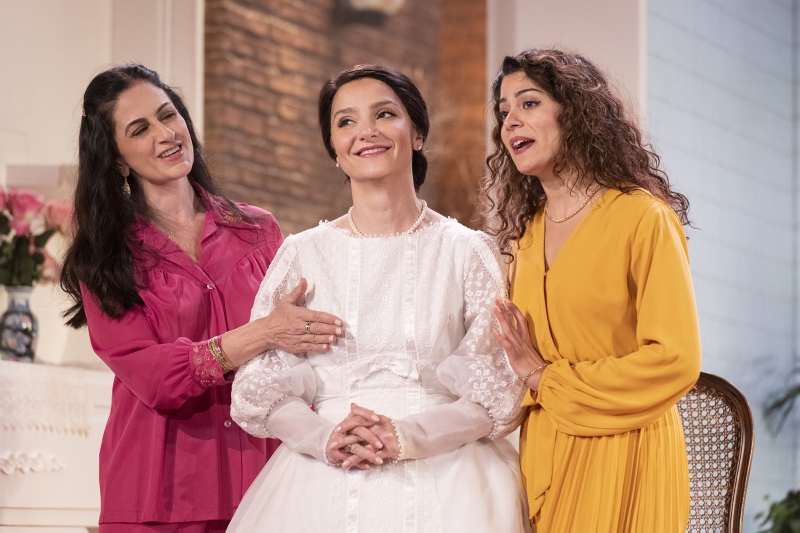
Photo by Robert Huskey/SCR.
These conversations are both hilarious, revelatory, and even wonderfully ordinary, testing and attesting to their strong bonds that make them more like actual blood relatives. In a way, such conversations also reveal what a privilege it is to see women on this side of the world able to speak so candidly like this, knowing that an oppressive regime is just looming on the horizon. Both hopes and fears are shared in abundance, alluding occasionally to the troubles bubbling to the surface outside that threaten to derail their aspirations.
The play continues forward as a series of vignettes that are marked by the passage of time, indicated by costume updates (beautifully designed by Shahrzad Mazaheri), props and set swaps, and, more eerily, the decreasing number of characters occupying the stage during these vignettes (the show's printed program includes a handy timeline guide that matches historical events with specific occurrences to the story). Some marry off and move, while others just disappear, seemingly without a trace.
As the political situation in Iran worsens, the characters face decisions that challenge their sense of identity and patriotism, adding a layer of tension to the personal stories. Though not the play's main objective, the theme of displacement hovers in WISH YOU WERE HERE, as some characters consider leaving (or are forced to leave) Iran, confronting the pain of departing their homeland (perhaps for good) and the uncertainty presented with living life abroad away from friends and family. Throughout the play, the narrative sensitively portrays the struggle between staying true to one's roots and adapting to a new environment out of survival.
Toossi's remarkable dialogue and the actors' portrayals also vividly capture the impact of the political upheaval on ordinary citizens—especially women—whose freedoms and choices are increasingly restricted. For some of the women, the idea of pursuing their dreams when it comes to a career or a family is much more unrealistic in their evolving environment. The play serves as a commentary on how political changes permeate daily life and alter the trajectory of individuals.
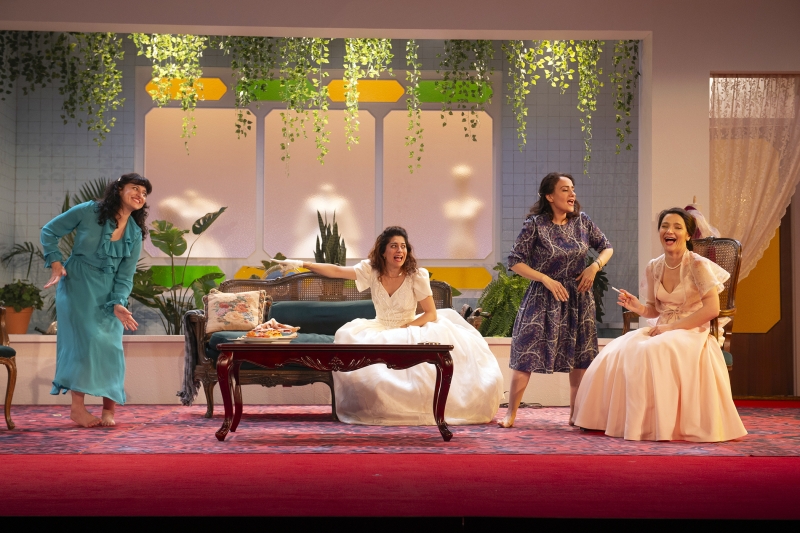
Photo by Robert Huskey/SCR.
The play continuously jumps between different periods in the women's lives, allowing the audience to see the long-term effects of the revolution on each character, highlighting the enduring nature of their friendships despite the physical and emotional distances that develop. And as their numbers dwindle, those friend group roles they once occupied one year, may evolve to something else down the line.
Overall, what makes WISH YOU WERE HERE so compelling is that—rather than pepper the audience with too many factoids about the events happening outside Nazanin's house (we know it's bad)—Toossi humanizes the political narrative by focusing on personal stories,
making the play relatable to audiences beyond its specific cultural context. As someone who also emigrated to the United States with my family right at the brink of a revolution in my own home country, I especially related to the story in the play and the idea of "leaving behind" those who may not have the means to escape.
My only criticism of the production is a cosmetic one, in which the play temporarily loses its momentum during scene transitions, when we visibly see stagehands with their hats and headset mics in the semi-dark resetting furniture or placing props in between scenes. Their presence certainly takes me out of the action, but then again, I suppose there's really no other alternative other than going into complete darkness in order to shield the audience from seeing this occur. It's a minor gripe, that in the grand scheme of things didn't hinder the play from its ultimate impact.
In essence, WISH YOU WERE HERE is a compelling examination of how political events shape personal lives, especially for women. Toossi's thoughtful writing and rich character development create a resonant piece that speaks to the enduring power of friendship and the complex experience of displacement. The play invites audiences to reflect on their own relationships and friend groups and the ways in which external forces can influence personal choices and identities.
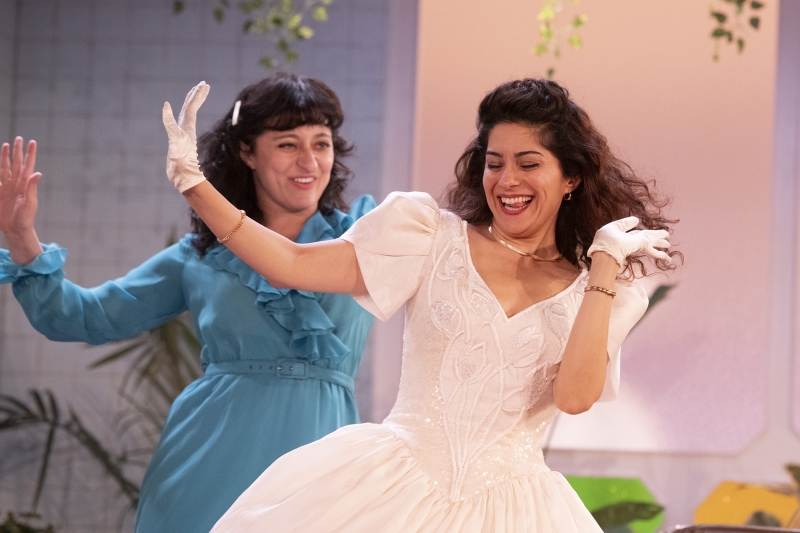
Photo by Robert Huskey/SCR.
The phrase "Wish You Were Here"—mostly found as a glib statement found on touristy postcards—here takes on a much more loaded connotation. It is at once heartbreaking as it is hopeful, in that its recipient is, hopefully, granted safety and comfort wherever they may be. But it could be also be a greeting given to an ex-pat who has fled one's native country; or it could be towards a loved one left behind to face the ravages of an oppressive society rather than be at a much more serene environment. Both can apply to the core narrative of this play.
Because it's true that sometimes you can't go home, it's also true that home could be anywhere in the world if it means being at a place where you can be yourself and live a life free from the dangers of war.
** Follow this reviewer on Bluesky / Instagram / Twitter X / Threads: @cre8iveMLQ **
-----
Photos by Robert Huskey, courtesy of South Coast Repertory.
Performances of WISH YOU WERE HERE at South Coast Repertory continue through February 2, 2025. Tickets can be purchased online at www.scr.org, by phone at (714) 708-5555 or by visiting the box office at 655 Town Center Drive in Costa Mesa.
Reader Reviews

Videos

